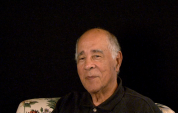4:48 | After liberating a concentration camp, Jesse Oxendine's unit returned to France and were there when the war ended. They were rewarded with a plum assignment, representing US forces in occupied Berlin. They quickly discovered the night life.
Keywords : Jesse Oxendine Elbe River Russian Army concentration camp Sissone France James M. Gavin Berlin Germany Hermannplatz fraternize

Uncle Sam came for him as soon as he graduated high school. Jesse Oxendine was needed in the big war, along with nearly every other boy in his class. His basic training was cut a little short because the Battle of the Bulge had depleted the ranks of more than one unit.
Jesse Oxendine thought all the Atlantic crossing was done in convoys, but he woke up his first morning at sea and was surprised to find the ship all alone in the ocean. It was a fast liner, able to outrun the German subs.
The 325th was confined to base on the coast of England, waiting for passage across the channel. That didn't stop Jesse Oxendine and his buddies from going to a USO club nearby. They managed to get out and back in through the wire without getting caught. The trip to Le Havre was in an old French freighter, not a pleasant ride.
Jesse Oxendine was sent to a replacement center near the Belgian border. It was in a marvelous old fortress and it was there that he was assigned to a glider infantry unit, part of the 82nd Airborne. He really liked the jump boots but he noticed that nearly every soldier had a Purple Heart.
Crawling under machine gun fire was something he had done several times in training, so when Jesse Oxendine got to Cologne and heard gunfire, he thought they were making him do it again. No, that's the real thing. Those German machine guns had a distinctive sound.
While at the Rhine River, a couple of guys found German machine guns. One of them was smart enough to take the ammunition out of it. The other one nearly made a casualty out of Jesse Oxendine. Then it was on to the Elbe River, where they prepared to take the town of Ludwigslust.
Allied troops were now moving into Germany itself. Jesse Oxendine's unit came across some sort of camp surrounded by wire. What they found inside was unbelievable. Skeletal prisoners with a shocking appearance, bodies stacked like wood, and huge furnaces. They had stumbled upon Wobbelin, one of the Nazi concentration camps.
Everybody wanted a Luger. The Germans were surrendering in droves and throwing their weapons in a big pile. Since the MP's were keeping the GI's away from the pile, Jesse Oxendine and some pals came up with a way to get some pistols.
While on guard duty in Berlin right after the war, Jesse Oxendine had more trouble with the Russians than anyone else. He recalls the time he and a buddy encountered four drunk Russian soldiers.
49 years after he was billeted in a Berlin apartment, Jesse Oxendine returned and sought out the building. The locals were delighted to meet him, including the country and western fan who was living in his apartment.
Jesse Oxendine sailed home on the Queen Mary. He had to wait around a week in New York because his unit was chosen for the victory parade. Word came about the atomic bomb while he was still in Berlin. He is thankful to President Truman that he didn't have to go invade Japan.
Jesse Oxendine never really had any close calls with the Germans in combat, but he came close to getting injured by his own comrades. He recalls the time a buddy got shot because of carelessness. The enemy did have a clear shot at him when he was helping some civilians recover their belongings. They didn't take it.
Jesse Oxendine and his three brothers were all fortunate enough to make it back from the war. One had been in Bastogne during the siege and another was not on the flight when his bomber was shot down.
His service in WWII was the most important time of his life. Years after the war, Jesse Oxendine teamed up with a German Jewish refugee to give lectures to schools and civic groups.
Get involved with your government and be very careful how you are led. That's what Jesse Oxendine advises after witnessing the evil of the Holocaust first hand. German officers and townspeople were made to witness the hellish conditions of the concentration camp he had helped liberate. He wondered, could I have done this?